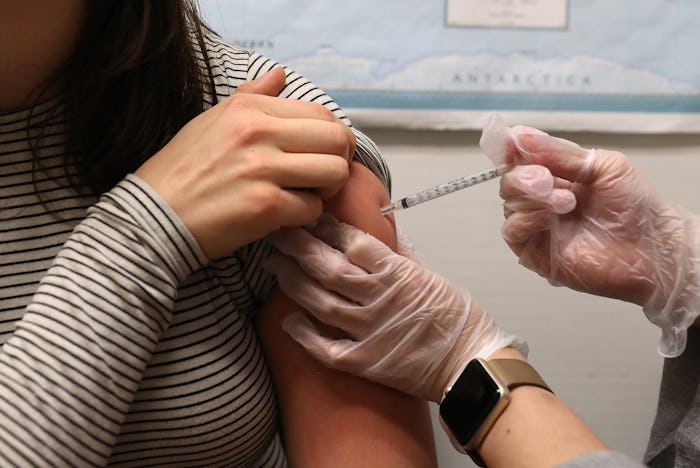Life

If You're Worried About Getting The Flu From The Flu Shot, Read This Right Now
We're here again. Flu season. It comes every year, stays a while, and generally causes people to lose their minds over a tiny stick and colorful bandaid. This time of year you can't turn around without hearing someone tell you about how that one time when they got the flu shot, they ended up with the flu. Honestly, it's a little tiring considering the preponderance of evidence put forward every year. For once and for all, does the flu shot give you the flu?
No. Absolutely not. The flu shot does not give you the flu, according to the American Academy of Pediatrics (AAP), The Centers for Disease Control and Prevention (CDC), Britain's National Health Service (NHS), The Canadian Health Care Service, The Mayo Clinic, and more. It may cause you to experience flu-like symptoms which are an immune response to vaccination, but not the flu itself, noted the CDC. These symptoms can range from a low grade fever, soreness at the injection site, and some aches and pains. However, most people experience zero side effects from the flu shot other than the annoying sting of pulling off the bandaid.
Pro-tip from someone who is a total klutz and ends up wearing a lot of plasters: use baby oil or cooking spray and there's no sting. Put it on a paper towel and rub it around the plaster until it just falls off.
The AAP isn't playing around this season. Last year over 80,000 people died from influenza. That's the population of a reasonably-sized city in the United States. That's why they're urging everyone to get the flu shot — not the mist — this flu season. I get that there is a metric crap ton of bad information spreading around the Internet that links the flu shot to everything from epilepsy to developing a love for Nickelback, but it's simply untrue. You can only blame yourself for your adoration of Chad Kroeger, don't blame the kindly flu shot.
The thing is, in the '90s, a former physician named Andrew Wakefield was looking for answers for the rise in autism cases he was seeing in his practice. He eventually got the harebrained idea that it was somehow linked to the preservatives in vaccines. The same preservatives that are preventing the vaccines from harming you by inhibiting the bacterial growth in the multi-dose vials of the substances, according to The Food and Drug Administration (FDA).
As it turned out, Wakefield made it all up. He falsified the documents, according to Time, he completed vast, fictionalized studies, and then got published in the Lancet, a respected medical journal. His legacy still endures, and you can see much of his thinking in people who believe that the flu shot can cause the flu, when it does not.
His supporters will tell you that the flu shot gives you the flu. Anyone who's on Facebook knows this. Science doesn't bore this out. And yes, you have to get the shot every year. A study published in JAMA found that getting the flu shot one year does not mean you are protected the next.
While the flu shot isn't going to give you the flu, what it will give you is a 30 to 60 percent chance of preventing the flu entirely, as per the AAP. Also, if you still develop the flu virus, your symptoms and illness will likely be less severe because your body has at least some protection against the disease, noted the CDC. I got the flu shot in September of last year and developed the flu in the spring. It sucked, it really did. But I didn't die. I'm still here.
And to make this point very clear, when you get the flu shot, you're not just doing it to protect yourself, though that is a great motivator. You're doing it to protect others, those people who are immunocompromised or too young to get the shot. People with cancer, people with heart defects, babies, and others who can't get the shot but rely on you to do your part.
Plus, if you get it done at Walgreens, they give you a heart-shaped bandaid, which is just really cool.